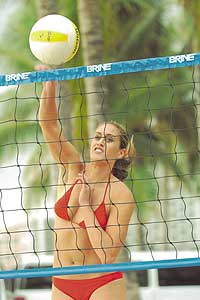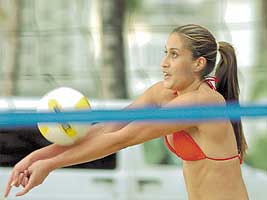|
When most people finish a five-year run of accolades and All-American
status, they take a little time off to reflect on what they have
accomplished, but not Lily Kahumoku.
Instead, two weeks after a
disappointing loss to Florida in the Final Four, she hopped on a plane to
spend her winter in Siberia. Yes, that Siberia, of the gulags and Arctic
winter fame.
“ It’s minus 20 outside, and it is like putting your face
into a hot oven,” says Kahumoku, now safely back in our Islands since
March 20. “You inhale the air and it burns your teeth, like biting into an
ice cream.”
So how does a native Hawaiian from Texas end up in
Khabarovsk, a town 500 miles northwest of Sapporo on the Chinese border?
It dates back to a 2002 exhibition match with the Russian club team
Samorodok. The Wahine crushed them — with Kahumoku leading the way with 26
kills — and the coveting began.
Once Kahumoku’s and fellow Wahine
Lauren Duggins’ college eligibility had expired, the Russian Gold-Mining
Company AMUR, which owns Samorodok, came with offers they couldn’t refuse.
 “ I was treated like a goddess,” says Kahumoku in the soft
tones of a child whispering secrets in the back of the class. “We stayed
in a three bedroom luxury suite, they took care of our meals, taxis and
gave us the newest technology in winter clothes.” “ I was treated like a goddess,” says Kahumoku in the soft
tones of a child whispering secrets in the back of the class. “We stayed
in a three bedroom luxury suite, they took care of our meals, taxis and
gave us the newest technology in winter clothes.”
This is not to
mention her salary that she declined to reveal, saying only that they took
very, very good care of her. Despite the royal treatment, her partner
Duggins lasted less than a month before packing for home, and Kahumoku
found herself longing for the Islands herself.
“ I cannot picture a
place more consummately different from Hawaii,” says Kahumoku, shaking her
head as she struggles for the words to capture it. “It was like a dream,
so surreal, like it wasn’t real, like The Matrix.”
She isn’t just
talking about the weather. While elegant, she found caviar for breakfast
each morning delicious, but not something she wanted every day. The
ubiquitousness of beets in the diet and the daily serving of borscht
(“Portuguese soup gone Russian”) had her wishing for a plate lunch.
Also, with her only English speaking ally gone, she had to learn
Russian on the fly.
“ It is so different from the Hawaiian language that has a lot of
vowels. There you have three, four, even five consonant sounds in a row
and it’s like, wow,” says Kahumoku before letting loose with a series of
Russian words to demonstrate.
She learned the language by watching
American movies dubbed into Russian, and while not fluent, she could
survive and, more importantly, play volleyball.
“ The language barrier
was the toughest thing; I didn’t know if my teammates are plotting my
death or want to be my best friend,” says Kahumoku. “You just don’t know
because they are so stoic. But now, I can’t speak English while playing
volleyball!”
Despite making loose connections with her team, there are
larger issues with the public as a whole in the post-USSR era of Eastern
Siberia.
“ There is a very strong anti-American sentiment in Russia
and it is very hard to get past that,” say Kahumoku.
But there is one
way to get past all prejudices, and that is to perform. Volleyball is the
second-largest women’s sport in Russia, attracting up to 6,000 fans to her
home games on the Amur River. All the games are televised, and with
winning comes acceptance.
“ It was so weird,” says Kahumoku, “people
would come up to me on the street and say, ‘We love your team, and we like
your play.’”
These accolades came with good reason. She took a
little-regarded Samorodok team and led them to a top 5 finish — their
first-ever — and assured them a spot in the Super League next season.
For this and her plus .500 kill percentage, she was awarded the first
Master of Sporta ever given to a foreign player. It is our equivalent of
All-Pro and something she will always cherish, even if she cannot spell
the award in the Russian crylic alphabet.
Taking the monetary earnings
and experience (“I went there pudding, now I’m jerky”) she is taking her
act to the AVP, America’s professional beach volleyball circuit. 
“
Part of the reason I went to Russia was to make money to pay for (AVP
Tour),” says Kahumoku, who has to pay for her own travel and lodging until
she garners some sponsors. “Ever since I was a little girl my dream was to
play beach volleyball with my older (half) sister, and now it’s coming
true.”
Her older sister is Jessica Alvarado-Brannan, star of the Long
Beach State team that went 36-0 in winning the National Championship in
1998, and now two-year veteran of the AVP tour.
The teaming seems
perfect with Kahumoku’s powerful style from the left and Alvarado’s ball
handling skills and passing on the right. Only problem, the two of them
have never played together and won’t have a chance to before their first
event April 23-25 in Tempe, Ariz.
Also the differences between a power
six-person indoor game and the finesse and stamina of the beach sport
could provide hurdles, but Kahumoku pooh-poohs such talk.
“ It’s not
going to be hard; our style is so similar and we talk so much, I don’t
think training together is that important right now,” say Kahumoku, who
plans on residing here in the Islands and finishing her degree at UH while
flying in for events.
Her professional career lies ahead of her, ripe
with the potential to become the next Gabrielle Reece, and poised to
represent the United States in the 2008 Olympics. If all goes well in the
AVP, look for her to be playing in the Hawaiian Invitational at Fort
DeRussy Sept. 23-25.
But even with her world travels and golden road
ahead, she still remembers those who brought her here.
“ By far,
Hawaii fans are the greatest in the world,” says Kahumoku, who tells of
Russian fans who, while exuberant, would throw bottle caps and rubbish at
them on the court. “I don’t think there is any other place that
appreciates women’s volleyball (like Hawaii) and really embraces the
sport, and I am so thankful for having that experience.”
|

